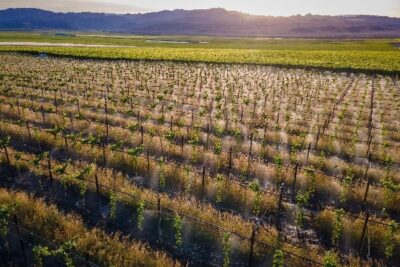By Freeman Ya Ngulu.
The new season’s grape harvest at Aussenkehr is in full swing. Aussenkehr, will have these grapes on international supermarket shelves by Christmas.
Some 700 ha is under table grapes at Aussenkehr making this facility in the desert one of the more significant grape producers in southern Africa. The farm has great expectations for the current season with the newly planted vines coming through strongly.
“To improve organic content in the soil we plant wheat between the new vines, ploughing it back into the soil and adding compost and woodchips.” said production manager, Gary Vaughan-Smith.
Aussenkehr Chief Executive, Andre Vermaak, who has been involved in growing grapes in the valley for around 16 years said table grapes need to have a good shelf live. It takes 30 to 34 days till they are on the shelves. You can have great varieties which have good volumes and great taste but if they can’t get to the markets in good shape, it won’t work.

According to Vermaak, Aussenkehr has 6 to 8 weeks of production that relies heavily on cold storage for 200,000 cartons each week.
“We do run into the early South African season, but that is when we have our red varieties, such as Jack Salute, Crimson or black ARRA 14 which are ready to harvest when South Africa only has the Flame variety available,” Vermaak said, adding that if you plant a late variety in an early area you can still get to the market in early January when no else has these varieties.
He said Namibia has no quarantine period for new rootstocks and there is no waiting list, so they can be shipped and planted right away and due to the climate a new vine can produce volumes within two years.
Meanwhile, having started twenty years ago, according to agricultural commodity portal, Freshplazza, the grape producers’ biggest challenge is heat and dust with temperatures reaching up to 50° Celsius.
“The relatively new production area in the valley is a long way away from any other settlement. The climate is ideal for growing grapes, as it is a hot arid desert climate where it rarely rains. The climate reduces the need for pesticides,” they added.
“Government has increased the supply of electricity to the valley but now just have to distribute it. Without sufficient power the water can’t be pumped from the river for irrigation. Water is not the biggest concern in Aussenkehr. However, in order for the companies there to expand, they need to have more electricity to work the pumps which bring the water to the vineyards and to power the packhouses,” Vermaak said.




Leave a Reply